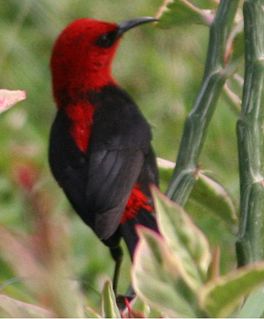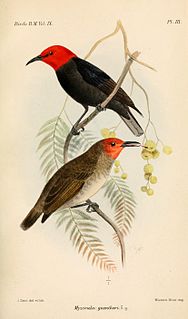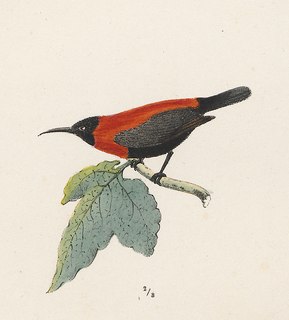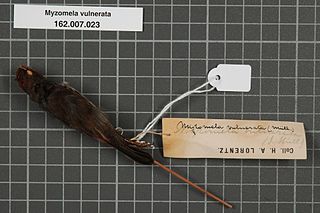
The dusky myzomela or dusky honeyeater is a small, brown bird that is a common resident of the Aru Islands, southern New Guinea and northern and eastern Australia, where there are two separated populations, one in the Top End, another from Cape York Peninsula along the east coast as far south as the New South Wales border, though the species is rare south of Rockhampton. The Moluccan myzomela, red-tinged myzomela, and Biak myzomela were formerly considered conspecific, but was split as distinct species by the IOC in 2021.

The scarlet myzomela or scarlet honeyeater is a small passerine bird of the honeyeater family Meliphagidae native to Australia. It was first described by English ornithologist John Latham in 1801. At 9 to 11 centimetres long, it is the smallest honeyeater in Australia. It has a short tail and relatively long down-curved bill. It is sexually dimorphic; the male is a striking bright red with black wings, while the female is entirely brown. The species is more vocal than most honeyeaters, and a variety of calls have been recorded, including a bell-like tinkling.

The mountain myzomela, elfin myzomela, or midget myzomela is a species of bird in the family Meliphagidae. It is found in New Guinea. Its natural habitats are subtropical or tropical moist lowland forests and subtropical or tropical moist montane forests.

Myzomela is a genus of bird in the honeyeater family Meliphagidae. It is the largest genus of honeyeaters, with 39 species, and the most geographically widespread. It ranges from Indonesia to Australia and into the islands of the Pacific Ocean as far as Micronesia and Samoa.

The drab myzomela or Seram myzomela is a species of bird in the family Meliphagidae. It is endemic to the islands of Seram, Boano and Ambon in Indonesia. Its natural habitats are subtropical or tropical moist lowland forests and subtropical or tropical moist montane forests.

The cardinal myzomela is a species of bird in the honeyeater family Meliphagidae. It is named for the scarlet color of the male. It is found in American Samoa, New Caledonia, Samoa, Solomon Islands, and Vanuatu, as well as some islands in Micronesia such as Yap. Its natural habitats are subtropical or tropical moist lowland forest and subtropical or tropical mangrove forest. It frequents areas with flowers, such as gardens. This is a small, active bird, measuring about 13 cm (5.1 in) from bill to tail. Males are red and black in coloration, females are grayish-olive, sometimes with a red cap or red head. Its long, curved bill is especially adapted for reaching into flowers for nectar. Cardinal myzomela populations have vanished from the island of Guam since the invasion of the brown tree snake.

The Sulawesi myzomela is a species of bird in the family Meliphagidae. It is endemic to Indonesia where it occurs in Sulawesi, Taliabu, Selayar and Tanah Jampea. Its natural habitats are subtropical or tropical moist lowland forests, subtropical or tropical mangrove forests, and subtropical or tropical moist montane forests.

The red myzomela is a species of bird in the family Meliphagidae. It is found in New Guinea and New Britain. Its natural habitats are subtropical or tropical moist lowland forests and subtropical or tropical moist montane forests.
The crimson-rumped myzomela or yellow-vented myzomela, is a species of bird in the family Meliphagidae. It is endemic to the Western Province.

The red-headed myzomela or red-headed honeyeater is a passerine bird of the honeyeater family Meliphagidae found in Australia, Indonesia, and Papua New Guinea. It was described by John Gould in 1840. Two subspecies are recognised, with the nominate race M. e. erythrocephala distributed around the tropical coastline of Australia, and M. e. infuscata in New Guinea. Though widely distributed, it is not abundant within this range. While the IUCN lists the Australian population of M. e. infuscata as being near threatened, as a whole the widespread range means that its conservation is of least concern.

The black-bellied myzomela, also known as the splendid myzomela, is a species of bird in the family Meliphagidae. It is endemic to the large island of New Britain, near New Guinea. Its natural habitat is subtropical or tropical moist lowland forests. An adult is 9 to 10cm, males weigh 7 to 9g while females weigh 6.5 to 7.5g. Males have predominantly black plumage with a scarlet red hood. Females are slightly smaller than males with a mainly olive colored plumage and a red mask covering the forehead. Both male and females have a black bill. Black-bellied myzomela feed on nectar, often in small parties. It has also been recorded to forage with other species like ashy myzomela and red myzomela.
The Wetar myzomela or crimson-hooded myzomela is a species of bird in the family Meliphagidae. It is endemic to Wetar.

The red-capped myzomela, also known as the scarlet-naped myzomela, is a species of bird in the family Meliphagidae. It is found in the Solomon Islands archipelago. Its natural habitats are subtropical or tropical moist lowland forests, subtropical or tropical mangrove forests, and subtropical or tropical moist montane forests.
The red-vested myzomela, also known as the red-bellied myzomela, is a species of bird in the family Meliphagidae. It is endemic to Malaita. Its natural habitats are subtropical or tropical moist lowland forests and subtropical or tropical moist montane forests. It is threatened by habitat loss.

The Papuan black myzomela is a species of bird in the family Meliphagidae. It is found in New Guinea and nearby islands. Its natural habitat is subtropical or tropical moist lowland forests and savannah woodland. It can be often found at flowering trees such as albizias and eucalypts.
The New Ireland myzomela, crimson-fronted myzomela or olive-yellow myzomela is a species of bird in the family Meliphagidae. It is endemic to Papua New Guinea.

The red-collared myzomela is a species of bird in the family Meliphagidae. It is found in New Guinea. The long-billed myzomela of Goodenough Island was formerly considered conspecific, but was split as a distinct species by the IOC in 2021.
The sooty myzomela is a species of bird in the family Meliphagidae. It is endemic to Makira.

The black-breasted myzomela or red-rumped myzomela is a species of bird in the family Meliphagidae. It is found on Timor island. Its natural habitat is subtropical or tropical dry forests.

The reddish myzomela is a species of bird in the family Meliphagidae. It is endemic to Papua New Guinea, where it is found on New Ireland and adjacent islands. Its natural habitats are subtropical or tropical moist lowland forests and subtropical or tropical moist montane forests.















